On this page
- What is the purpose of organizational culture?
- Organizational culture statistics that can’t be missed
- The business case for culture
- What is the role of organizational culture?
- Why is organizational culture important?
- Organizational culture as a talent magnet and employer branding tool
- Looking through the Glassdoor employer branding statistics
- Parting shot
Why is organizational culture important? Why do you think your business and teams need a deeply aligned and sustainably nurtured culture to raise their game and ace their sport? Here are answers to all your whys related to organizational culture.
Let's dive in.
According to Google, there are 40 ways to say "Hello!" And that's just in the English language. Your organizational culture is the way you prefer to go about yours. If it qualifies as number 41, you've struck gold.
For you have truly differentiated yourself from a sea of rivals (and some me-too wannabes) with a unique "Hello!". Perhaps more significantly - thanks to the baritone, decibel, and spontaneous tilt of the head when you utter the word - you may have made an instant, and lifelong, connection with someone.
And that, right there, is your organizational culture.
What is the purpose of organizational culture?
Culture is the signature style in which you deliver your promise to your customers, employees, extended channels, general partners, and stakeholders.
Over time, that "Hello!" becomes your 'Halo' - a hallowed code rivals can emulate but never copy, an insurance against the market that's fast becoming commoditized, and a holy password for employees who subscribe to the tribe.
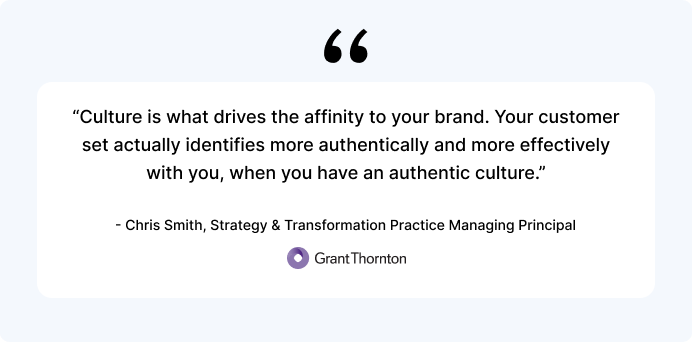
Organizational culture statistics that can’t be missed
↠ 86% of job seekers avoid companies with a bad reputation.
↠ Company culture is at least somewhat important to 83% of urban workers.
↠ Millennials prioritize "people and culture fit" above everything else.
↠ There is a correlation between employees who say they are "happy at work" and feel "valued by [their] company" - and those who say their organization has a clearly articulated and lived culture.
↠ Almost 70% of Americans prioritize "culture aspects" over salaries. (Lexington Law).
↠ 69% of employees would work harder if they received more recognition.
↠ Team leaders have the highest impact on company culture. 94% of entrepreneurs and 88% of job seekers say that healthy workplace culture is vital for success.
↠ 83% of executives and 84% of employees rank having engaged and motivated employees as the top factor contributing to a company's success.
↠ 47% of proud professionals of their company say it has a positive culture that allows them to be themselves.
↠ 94% of executives and 88% of employees believe a distinct workplace culture is vital to business success.
↠ Company culture is important to 74% of the US and UK employees polled. (Speakap).
↠ Highly engaged business units achieve 59% less employee turnover/attrition (Gallup's State of the American Workplace report).
↠ Candidates are less likely to leave an organization where they are an excellent cultural fit, according to 81% of hiring managers. (Robert Walters)
↠ 55% of businesses say that higher engagement would improve their ability to retain, recruit, or carry out succession planning (CBI's 2018 survey).
↠ 91% of respondents (executives and employees) who said their company had a strong sense of purpose also said their company had a history of strong financial performance.
↠ A culture that attracts high-caliber employees leads to a 33% revenue increase.
↠ Strong cultures resulted in a 4X increase in revenue growth. (Forbes). An influential culture can account for up to 50% of the differential in performance between organizations in the same sector.
↠ An employee who feels engaged and inspired is 125% more productive than the satisfied staffer (Bain & Company: Time. Talent. Energy).
↠ Having highly engaged employees can lead to a 202% increase in performance.
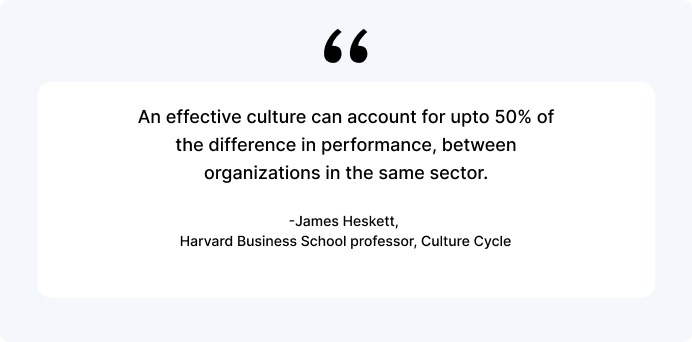
The business case for culture
Is it because it suits your c-suite?
An organization can have all the technology, support, and funding, but the culture will ultimately decide outcomes and success.
That is because culture influences the ONE business capital that controls all the others: PEOPLE. In times of peace, the right culture will keep workers engaged, happy, and productive.
In times of uncertainty and disruption, it will empower them to respond, pivot, and reboot.
As a result of its "hold over people," culture leaves a strong imprint on practically every business manner and function - strategy, operations, finance, HR, marketing, sales, and customer service.
It guides expectations, builds resilience, informs decisions, and influences planning. Indeed, leaders, today acknowledge organizational culture as one of the primary drivers of financial performance and a tested tactic to compare one's standing with competitors.
Due to all these factors - but primarily due to its power to attract and retain top talent, something that has emerged as the ultimate competitive edge for companies today, culture is fast becoming the king of boardroom KPI's. Culture's star truly is on the ascent today.
The concept has made its way into Merriam Webster's "Most Popular Word Of The Year." Companies putting culture in front are gaining cult status in the talent market, and culture manifestos are among the most shared forms of content online.
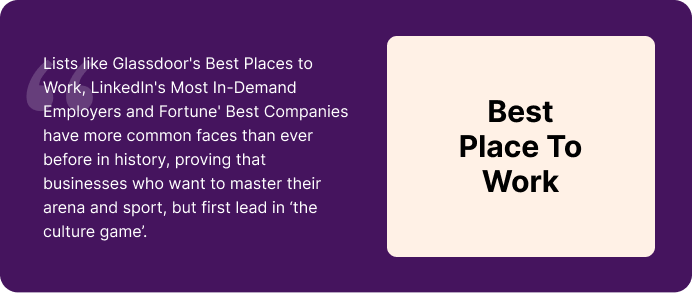
What is the role of organizational culture?
Organizational culture affects every spoke that makes the wheels of business turn - employees, suppliers, customers, investors, the communities it operates in, and the broader social and natural environment.
Studies have consistently proven why is organizational culture important in business. It can potentially affect ALL the ten fundamental dimensions which Senior McKinsey partners Mary Meaney and Scott Keller talk about in their book, Leading Organizations:
- Attracting and retaining talent
- Developing current talent
- Managing performance
- Creating leadership teams
- Making decisions
- Reorganizing to capture value quickly
- Reducing overhead costs for the long term
- Competitive advantage
- Leading transformational change
- Transitioning to new leadership roles
Why is organizational culture important?
When you win in culture, you win everywhere. Let’s take a look at eight reasons why organizational culture is important.
1. Culture: the aligner
Organizations gain momentum when their employees are aligned and moving in the same direction as the business goal with passion and verve. This momentum allows them to deliver a seamless and differentiated customer journey while creating a compelling employee experience.
Alignment means that everyone - from customers to current and prospective employees, shareholders, industry influencers, and members of the media - thinks and talks about the company, in the same way, stressing the same accents and metaphors.
Alignment also allows the company culture to provide direction for leaders, managers, and individual contributors, clarifying how to prioritize their time, energy, and resources.
2. Culture: the multiplier
Of all the traits and strengths an organization must build to stay ahead of the game, connecting its employees to their work "at a personal level" is perhaps the most profound and powerful.
As it turns out, it is also the slipperiest and trickiest. That's because workers are reflexively wired to interpret employment as barely more than a source of money and livelihood. And most leaders will, by default, prefer to fulcrum their understanding of their firm from an economic point of view.
That's changing fast, of course. After all, organizations that manage to make their mission personal to employees are reaping big.
A Gallup research shows that only a 10% enhancement to employees' connection with the organizational mission or purpose can snowball into a substantial 4.4% increase in profitability.
This is precisely how the right culture makes a difference by bringing purpose front and center of the workplace experience. So what exactly does purpose do? Well, it can bridge what employees do best with the activity their company does best.
And it can bridge what employees care the most about to the transformational impact the organization engineers for its industry, society, and environment.
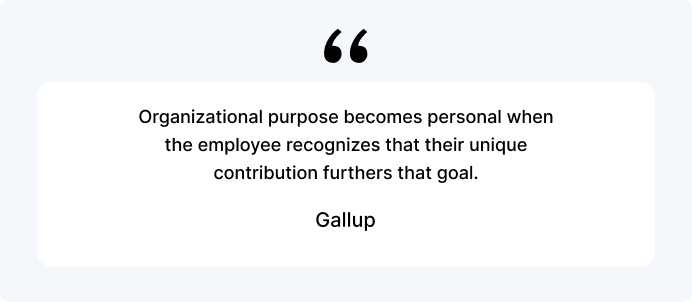
3. Culture: the implementor
Culture bridges your vision to your execution. It offers structure and expression to a company's strategy and goals. Culture is the muscle and method that clears the mayhem and madness that too many choices can bring and makes a clear path you can trust and take.
And as you advance, it keeps adding the clarity and focus required to make great decisions on the go.
If your business is the play, your culture is the playbook.
4. Culture: the GPS
It is important to note that culture can also be a powerful transformation lever, especially in a time of flux and uncertainty.
A well-defined and deeply engrained culture code can help an organization maneuver and master the choppy waters of change without "selling out" its core.
This is why leaders who find culture too complex a jigsaw to solve (and leave it to "fester on its own" on the backburner, or relegate it to HR) let go of what could have been a powerfully unique competitive advantage. Maybe even the difference between survival and demise.
5. Culture: the decision-maker
Culture is often a good indicator of whether a new product launch, a new merger, or a new hire will fly. That's because it can diagnose whether these actions are organically synced to the "soul" (raison-d'etre) of the business (and will therefore help "fulfil" its cause or destiny), or – not unlike faulty medication - are likely to be rejected by the system's vitals.
This is the reason leaders who have their finger firmly on the pulse of their teams are often better placed to make big decisions - as opposed to peers sporting fancier qualifications, backgrounds, and titles.
6. Culture: the unassailable edge
In a rapidly commoditized and competitive world, where technology has been democratized, talent is fished from common pools, and success models effortlessly replicated, it is your workplace culture alone that sets you apart. And distinguishes your brand from the clutter.
That is because culture originates from a deeply "human place." No two humans are equal, making culture inherently tricky to copy.
In a time when businesses are scratching their heads on how to gain the fleeting attention of their markets (today's most precious currency), culture offers a simple, though not necessarily "easy," way out.
7. Culture: the sword with a dual-edge
Culture can be a tailwind or a headwind, depending on the direction you face. While positive "tribal" energies can lead to high performance and strong team morale, workplaces with a toxic atmosphere often experience the reverse effect and end up paying a heavy price (which goes beyond sub-optimal performance) if they refuse to mend their ways in time.
The downfall of the American energy behemoth Enron is a case in point, where undermining colleagues and championing individuals had become the norm.
In another instance, employee performance suffered when workers received mixed signals from a merger that featured two companies - one with a culture of "low cost" and the other with "quality service," seeding conflict and confusion.
70% of transformations fail, primarily due to people and culture-related challenges. - Brooke Weddle (in conversation with McKinsey Global Publishing's Lucia Rahilly)
8. Culture: the health tonic
With the pandemic bringing the issue of mental wellness firmly under the spotlight, the onus is squarely upon talent leaders and workplace designers to ensure employees stay hale, hearty, and happy at work.
So what exactly is it that makes a worker happy at work? Research suggests that the primary drivers are psychological safety (linked to trust), flexibility, autonomy, listening, inclusion & diversity, a sense of belonging, and a consistent cycle of incentive rewards.
The flip side makes for an equally compelling reminder - toxic cultures can build up unnecessary stress, wreck relationships not just in the workplace but also at home, and lead to burnout.
The cost of poor wellbeing
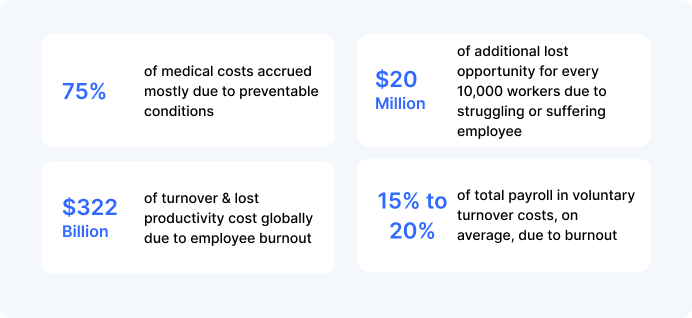
Happy bonus = employee happiness + employer banding
A trust-driven and supportive workplace culture can lead to healthier workers and have a multiplier effect on how they perceive their leadership, adding to the employer brand.
"People that have high individual well-being are more likely to see their workplace as positive, productive, and engaging. Conversely, if they are struggling or suffering, it rubs off on the workplace and the team."
- Jim Harter, Ph.D., Gallup's chief scientist of workplace management and well-being.
Healing a pandemic called overwork
Companies are hiring Chief Health Officers, Head of Safety, and Directors of Wellbeing like never before. Businesses are now training leaders in skills like listening, flexibility, and care slash empathy.
Overwork is an epidemic now, and banks like JPM Chase are implementing new management policies to force people to take weekends off…. CEO now means Chief Empathy Officer. - Josh Bersin
And finally. the 'biggie'...
Organizational culture as a talent magnet and employer branding tool
Today's top talent wants meaningful work, opportunities to develop and grow, and flexible working conditions. - Mckinsey
↠ 65% of employees say that their company's culture is a crucial factor when deciding to stay at their job.
↠ Companies with winning organizational cultures have 72% higher employee engagement ratings than organizations with weak cultures.
↠ 77% of US employees believe a strong company culture enables them to produce their best work.
↠ Converse to the above, 86% of potential hires would avoid applying for a company that has an uncharitable reputation with former employees or the public, and 65% of employees would likely quit an organization with disreputable business practices.
Talent doesn't join companies. They join missions.
"The new wave of talent has grown up reading about Google and Facebook, which, despite their size, promote a very employee-focused culture. This new talent wants to make an impact and sees their career as the primary way to make a difference. Meaningful work has never been more important.
They're also obsessed with personal development and growth - both inside and outside of the workplace - and seek out organizations that can satisfy these needs." - Alice Bentinck: Co-Founder, Entrepreneur First.
The productivity lift an organization gets from its best talent is often remarkable. Superior talent is known to be up to eight times more productive.
Indeed, a study conducted with over 600K entertainers, researchers, and politicians showed that the productivity of high performers, in general, can be 400% greater than their "average" counterparts.
And in highly complex occupations that feature intimate interactions between people, processes, and technology, top performers can be an unbelievable 800% more productive.
Engagement is the performance dimension of culture.
An engagement-first cultural framework that helps you not only attract top talent but also "put them to work," so to speak, in the best possible way by inspiring them to bring their "full self" to the office every day.
Organizations with engaged and committed workers have distinctly higher customer loyalty, employee retention, and revenues. But engagement isn't everything.
Culture designers must also ensure that strengths are celebrated, inclusivity is nurtured, growth provisioned for, and achievement rewarded.
“Go after the cream of the cream. A small team of A+ players can run circles around a giant team of B and C players.” - Steve Jobs, Apple.
When you get your talent dimension right, your trophy is the Holy Grail of every modern-day business - a magnetic "employer brand." Here's why a carefully crafted and consistently deployed employer branding program is a must-have for companies today.
Looking through the Glassdoor employer branding statistics
↠ 86% of job seekers and employees research company reviews and ratings to decide where to apply for a job.
↠ 75% of active job seekers are likely to apply for a role if the employer actively manages its employer brand.
↠ 67% of men and 86% of women (US) wouldn't join a company with a bad reputation.
↠ 48% of Baby Boomers, 68% of Millennials, and 54% of GenX-ers confided that they visit an employer's social media page specifically to evaluate the employer's brand.
↠ 50% of job seekers will refuse to work for a company with a bad reputation, even for a pay increase.
↠ 92% of folks would consider a change if offered a position in an organization boasting an excellent corporate reputation.
↠ A strong employer brand has the power to reduce the cost per hire by as much as 50%.
↠ A negative reputation can cost a company as much as 10% more for every candidate they hire.
↠ Nearly a third of job seekers have quit a role within the first ninety days of joining (indicating misalignment between the candidate and the employer brand).
↠ 7 of 10 people (in a survey) said they had revised their opinion about a company after seeing the company reply to a review.
↠ Companies actively investing in employer branding can reduce turnover by as much as 28%.
Linking-in with employer branding
↠ 59% of recruiting leaders globally are stepping up investments in an employer brand.
↠ 55% of global recruiting leaders have a proactive employer brand strategy in place.
↠ 39% of respondents believe employer brand is going to be a long-lasting trend for the future.
↠ A great employer brand can help reduce cost-per-hire by a whopping 50%.
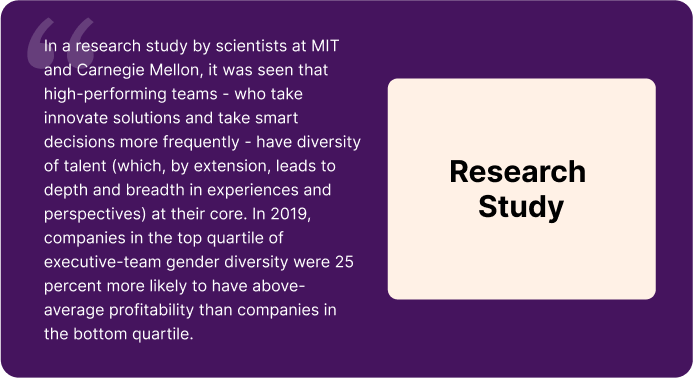
Talent is scarce and worth fighting for
It was McKinsey's Steven Hankin who first realized this, subsequently coining the term 'War For Talent' in 1997 (his 2001 book spinoff, by the same name, became a runaway bestseller).
Not surprisingly, there is a war to build the "best workplace in the world." Perks like BMW bikes, luxury vacations, free food, yoga classes, pet pedicures, and movie screenings don't raise eyebrows anymore.
Organizations levering on culture as their primary employer value proposition (EVP) are witnessing huge pay-offs. Wegmans - ranked by Fortune as the 7the best company to work in, reengineered its business goalposts just so that it can attract better talent.
"Take care of your people and they will take care of your customers," as the saying goes.
Parting shot
With its potent mix of shared aspiration and visceral bonding, culture makes you more than who you are.
"Why do certain groups add up to be greater than the sum of their parts, while others add up to be less?"
Daniel Coyle begins the introduction of his brilliant bestseller, "The Culture Code," with this cryptic question. The chapter is aptly named "When Two Plus Two Equals Ten." The answer is culture.
When judiciously unleashed, it holds tremendous tribal force that can punch far above its weight, accomplish much more than what a cursory "capability audit" might suggest, and always adds up to more than the sum of your parts.



















